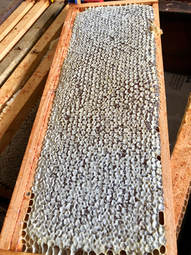|
This year has been a much a better year for honey bees, according to Somerset Beekeepers’ Association.
Most of the county’s 850 beekeeper-members had a good harvest and are going into the winter with more colonies of honeybees. Anne Pike, Chairman of SBKA, said: “Generally, this season has been a good year for Somerset beekeepers with honey harvests recovering and the creation of more honeybee colonies going into the winter. “The average harvest is a very healthy 35-40 lb per colony while a very few beekeepers had a truly fabulous season with between 150 and 200 lb per colony. “However, it was a rather hit or miss affair as the size of the harvest depends not only on good temperatures and fine weather, but also on lots of nectar producing plants. Some plants were adversely affected by the hard winter and heatwave summer while others including oilseed rape, field beans, blackberries and tree blossom thrived. “Beekeepers appreciate the help of local gardeners in planting bee-friendly blooms – apparently spring-germinated borage tops the polls as the bees’ favourite flower – and farmers who have created wildlife friendly field margins and traditional hedges. “This week the bees should be continuing to forage on autumn flowering plants like ivy and this is a key time to look out for their hugely destructive predator the Asian hornets. These hornets, dubbed large black wasps, prey on foraging honeybees and, where they get established, decimate the insect population. “The Asian hornet has a distinctive orange face and yellow tipped legs. Any sightings should be reported immediately, preferably with a photo, to the Non-Native Species Secretariat (NNSS)." http://www.nonnativespecies.org Local honey supplied by SBKA members is available in many independent shops and at local markets. Ends |
Archives
September 2023
Categories
All
|
Somerset Beekeepers Association Charity © 2021 Registered CIO Charity 1206483
Affiliated to the British Beekeepers Association
Click here to view our Privacy Policy
Affiliated to the British Beekeepers Association
Click here to view our Privacy Policy

 RSS Feed
RSS Feed
